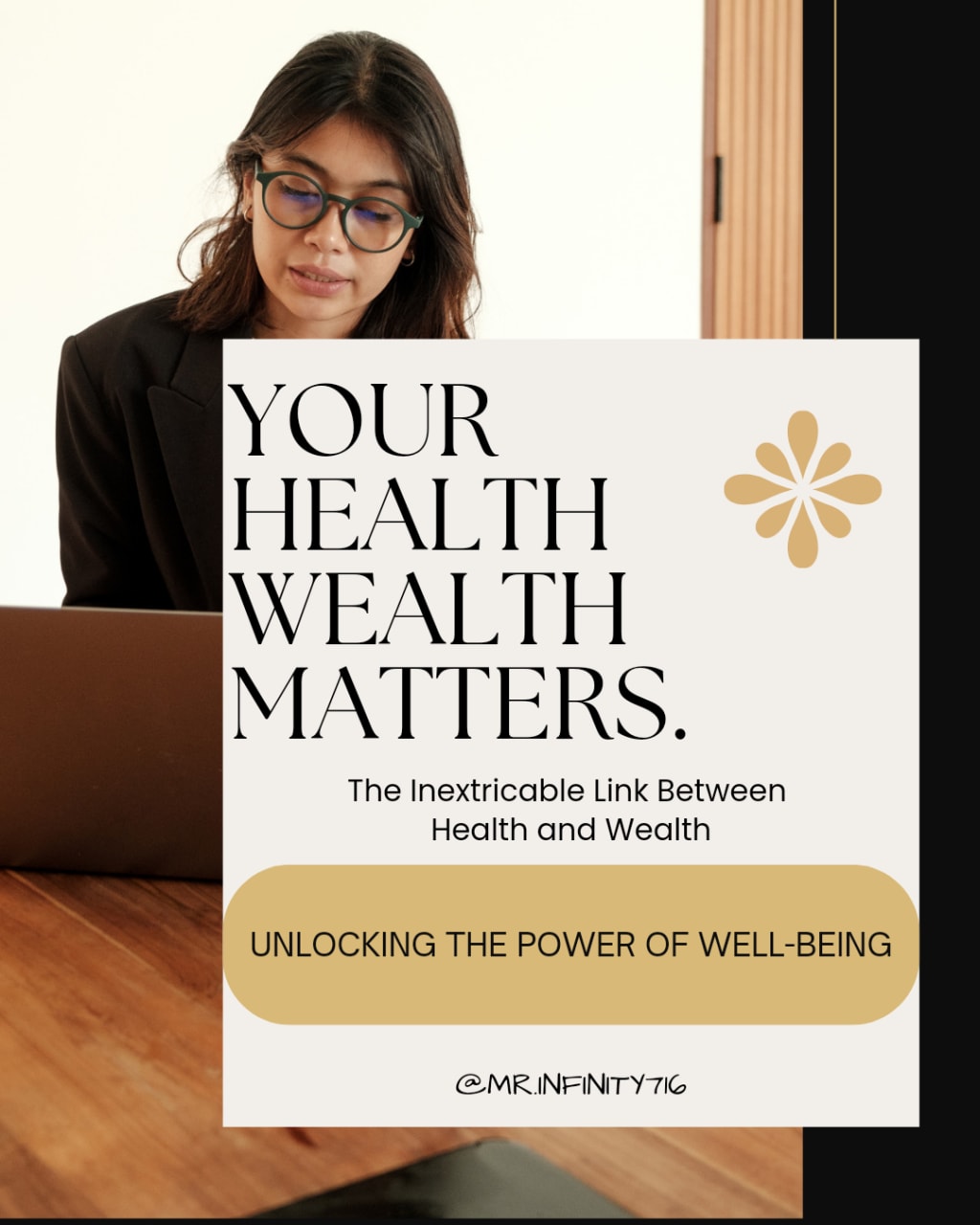Unlocking the Power of Well-being
The Inextricable Link Between Health and Wealth

Introduction:
In the pursuit of a fulfilling and successful life, two fundamental aspects play a crucial role: health and wealth. While health refers to physical, mental, and emotional well-being, wealth encompasses financial stability and abundance. Although these two concepts may seem distinct, they are undeniably interconnected, with a symbiotic relationship that significantly impacts our lives. This article explores the intricate relationship between health and wealth, highlighting the profound influence they have on one another and providing insights into harnessing their power to lead a prosperous and fulfilling existence.
Physical Health as the Foundation:
physical health serves as the foundation for our overall well-being and is the cornerstone upon which all other aspects of our lives are built. When we talk about physical health, we are referring to the condition of our body, including its ability to function optimally, resist diseases, and recover from illness or injury.
Here are some key points that explain why physical health is considered the foundation:
Energy and Vitality:
Good physical health provides us with the energy and vitality necessary to engage in daily activities, pursue our goals, and fulfil our responsibilities. When we are in good health, we have the stamina and endurance to carry out tasks efficiently, whether it’s working, studying, or engaging in recreational activities.
Productivity and Performance:
Physical well-being directly impacts our productivity and performance, both in personal and professional domains. When we are physically healthy, we can focus better, think more clearly, and maintain higher levels of concentration. This translates into improved performance at work, increased creativity, and enhanced problem-solving abilities.
Disease Prevention and Reduced Medical Expenses:
Maintaining good physical health through regular exercise, a balanced diet, and healthy lifestyle choices helps prevent various chronic diseases such as cardiovascular conditions, diabetes, and obesity. By taking preventive measures, we can reduce the risk of developing these illnesses and lower medical expenses associated with treatments, medications, and hospitalizations.
Longevity and Quality of Life:
Physical health is closely tied to longevity and the quality of life. When we take care of our bodies by engaging in physical activities, eating nutritious food, and getting sufficient rest, we increase our chances of living a longer and healthier life. Good physical health allows us to enjoy a higher quality of life, free from the limitations and discomfort caused by chronic diseases or physical ailments.
Emotional Well-being:
Physical health has a significant impact on our emotional well-being. Engaging in regular physical activity, such as exercise or sports, releases endorphins, which are known as “feel-good” hormones that boost mood, reduce stress, and alleviate symptoms of anxiety and depression. Taking care of our physical health can improve our overall mental and emotional state, leading to a more positive outlook on life.
Financial Stability:
Physical health plays a crucial role in our financial stability and wealth accumulation. Being physically healthy allows us to engage in work or business activities consistently, which leads to a more stable income. It also reduces the likelihood of incurring medical expenses, enabling us to allocate resources towards savings, investments, and long-term financial goals.
MENTAL AND EMOTIONAL WELL-BEING AS CATALYSTS
A healthy mind and emotional well-being play a pivotal role in our ability to generate wealth and make sound financial decisions. Mental clarity, focus, and emotional stability are essential traits for effective decision-making, problem-solving, and strategic planning. By prioritizing mental health through practices like meditation, mindfulness, and therapy, we can cultivate resilience, creativity, and the capacity to adapt to the ever-changing dynamics of the wealth landscape. A balanced emotional state empowers us to resist impulsive financial decisions driven by fear, anxiety, or stress, ensuring more rational choices that align with long-term wealth-building goals.
Why mental and emotional well-being are considered catalysts:
Decision-Making and Problem-Solving:
A healthy state of mind and emotional well-being are crucial for effective decision-making and problem-solving skills. When our mental health is optimized, we can think clearly, assess situations objectively, and make rational choices. Emotional well-being helps us manage stress, regulate our emotions, and approach challenges with resilience and adaptability. This clarity of mind and emotional stability enable us to make informed financial decisions, evaluate risks, and seize opportunities that align with our long-term wealth-building goals.
Creativity and Innovation:
Mental and emotional well-being are closely linked to creativity and innovation. When we are in a positive emotional state, free from excessive stress and anxiety, our minds are more open to new ideas and possibilities. Emotional well-being fosters a sense of curiosity, flexibility, and outside-the-box thinking, allowing us to explore innovative approaches to wealth generation and financial strategies. By nurturing our mental and emotional health, we unlock our creative potential and uncover unique opportunities for financial growth.
Resilience and Adaptability:
Mental and emotional well-being contribute to our resilience and adaptability, which are essential qualities in the pursuit of wealth. Financial journeys often involve setbacks, challenges, and unexpected circumstances. With strong mental and emotional well-being, we can navigate these obstacles with resilience, bounce back from failures, and learn from experiences. The ability to adapt to changing market conditions, economic fluctuations, and personal circumstances ensures that we can continue progressing towards our financial goals without being derailed by setbacks.
Financial Prudence and Long-term Planning:
Emotional well-being plays a significant role in maintaining financial prudence and making sound long-term plans. When we are emotionally balanced, we are less likely to make impulsive financial decisions driven by fear, anxiety, or greed. Emotional well-being allows us to approach financial matters with a level-headed perspective, weighing the risks and rewards and making decisions that align with our long-term financial objectives. By prioritizing our mental and emotional health, we cultivate the patience, discipline, and emotional intelligence needed to make wise financial choices.
Relationship with Wealth:
Mental and emotional well-being shape our relationship with wealth and success. When we have a healthy mind-set and positive emotional well-being, we develop a healthy attitude towards wealth. We view wealth as a tool for achieving our goals, making a positive impact, and finding fulfilment, rather than as an end in itself. This mind-set fosters a healthier approach to wealth accumulation, ensuring that our financial pursuits are aligned with our values, purpose, and overall well-being.
Wealth as a Facilitator of Health
While health serves as a prerequisite for wealth, wealth itself can significantly contribute to our overall well-being. Financial stability provides us with access to quality healthcare, enabling us to prioritize preventative measures, early interventions, and timely treatments. It alleviates stress related to medical expenses, ensuring peace of mind and reducing the strain on our mental and emotional health. Moreover, wealth grants us the freedom to pursue activities that promote a healthy lifestyle, such as gym memberships, nutritious diets, and wellness retreats. By investing in our health, we can enhance our productivity, energy levels, and longevity, thereby opening doors to greater financial opportunities.
Why wealth is considered a facilitator of health:
Access To Quality Healthcare:
Wealth provides us with the means to access high-quality healthcare services. Adequate financial resources enable us to seek medical professionals, specialists, and facilities that can provide timely and effective healthcare interventions. With the ability to afford comprehensive health insurance coverage, regular check-ups, and preventive screenings, we can prioritize our health and detect potential health issues early on, leading to better outcomes and improved overall well-being.
Peace Of Mind And Reduced Stress:
Financial stability alleviates stress related to medical expenses and healthcare costs. When we have the financial means to cover healthcare expenses, we experience peace of mind, knowing that we can take care of ourselves and our loved ones in times of illness or emergencies. Reduced financial stress positively impacts our mental and emotional well-being, allowing us to focus on our health, recovery, and overall quality of life.
lifestyle choices and preventative measures:
Wealth grants us the freedom and resources to make lifestyle choices that promote good health. It enables us to invest in nutritious food, engage in physical activities, and adopt healthy habits. We can afford gym memberships, fitness equipment, and wellness programs that contribute to a healthy lifestyle. Financial resources also support access to healthy food options, organic products, and the time and means to prioritize self-care activities, such as relaxation, meditation, and stress management.
Enhanced Well-being And Longevity:
By investing in our health, both physically and mentally, we can enhance our overall well-being and increase our longevity. Wealth provides opportunities for experiences that promote well-being, such as vacations, recreational activities, and hobbies that contribute to stress reduction, personal growth, and happiness. These experiences positively impact our physical and mental health, ultimately leading to a longer and more fulfilling life.
Freedom To Make Health-conscious Choices:
Financial resources grant us the freedom to make health-conscious choices. We can afford organic, locally sourced food, invest in environmentally friendly products, and create living spaces that promote well-being. Wealth provides the flexibility to choose work environments that prioritize work-life balance, allowing for reduced stress levels and improved overall health. The ability to invest time and resources into self-care, personal development, and relationships can significantly impact our holistic well-being.
Philanthropic Opportunities:
Wealth offers the potential for philanthropy and giving back to society. Philanthropic efforts aimed at improving healthcare infrastructure, medical research, and access to healthcare for marginalized communities have the power to transform lives and promote health on a broader scale. Contributing to causes that align with our values and positively impact the health and well-being of others can provide a sense of purpose, fulfilment, and personal satisfaction.
STRATEGIES FOR SYNERGISTIC GROWTH
Holistic Approach:
Cultivate a holistic approach to life, considering health and wealth as interconnected facets. Emphasize self-care, healthy habits, and personal growth while simultaneously pursuing financial goals.
Financial Literacy:
Enhance your financial literacy to make informed decisions about investments, budgeting, and long-term wealth management. Seek professional advice and continuously educate yourself to optimize your financial well-being.
Goal Setting:
Establish clear health and wealth goals, both short-term and long-term. Ensure they are aligned and complement each other, promoting overall balance and synergy.
Work-life Balance:
Prioritize work-life balance to avoid burnout and preserve your physical and mental health. Allocate time for leisure, relaxation, and nurturing relationships, as they contribute to holistic well-being.
Mindfulness And Gratitude:
Practice mindfulness and gratitude to foster mental resilience, contentment, and financial prudence. Cultivating awareness and gratitude for your current health and financial state can motivate you to make wise choices for the future.
CONCLUSION
Health and wealth are intrinsically interconnected, with each influencing the other in profound ways. By recognizing the symbiotic relationship between these two aspects of life, we can unlock their combined power to lead a prosperous and fulfilling existence. Prioritizing physical





Comments
There are no comments for this story
Be the first to respond and start the conversation.